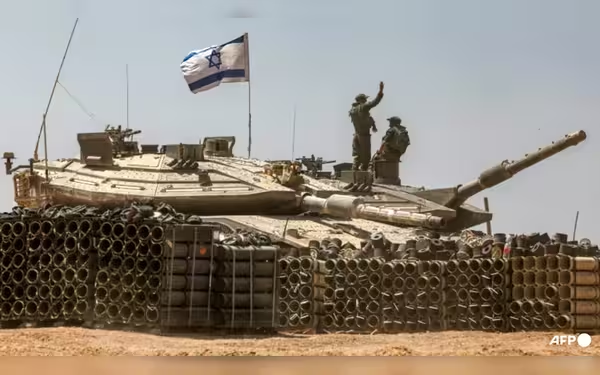Saturday, November 16, 2024 08:37 PM
U.S. Provides $8.7 Billion Aid Package to Israel Amid Lebanon Conflict
- U.S. secures $8.7 billion aid for Israel.
- Israel rejects 21-day ceasefire proposal.
- Netanyahu vows to continue military operations.
 Image Credits: pakistantoday
Image Credits: pakistantodayThe U.S. announces an $8.7 billion aid package for Israel as ceasefire efforts in Lebanon face rejection from Israeli leadership.
In a significant development, the Israeli defense ministry has announced that it has secured a new aid package worth $8.7 billion from the United States. This financial support is aimed at bolstering Israel's ongoing military operations. The announcement highlights the U.S. government's reluctance to leverage its military aid as a means to encourage a ceasefire in the escalating conflict in Lebanon.
Recently, U.S. Secretary of State Antony Blinken met with Israel’s strategic affairs minister in New York. During their discussion, Blinken emphasized that a ceasefire would enable civilians on both sides of the border to return to their homes. He warned that “further escalation of the conflict will only make that objective more difficult,” as stated by his spokesman, Matthew Miller.
Despite these diplomatic efforts, Israel has firmly rejected calls from its allies for a 21-day ceasefire in Lebanon. Israeli Prime Minister Benjamin Netanyahu has vowed to continue military operations against Hezbollah “until victory” is achieved. This stance comes ahead of Netanyahu’s anticipated address to the United Nations General Assembly.
The proposal for a 21-day truce was put forth by the United States, France, and other allies. However, Netanyahu dismissed the ceasefire suggestion, instructing the military to maintain “fighting with full force.” The White House expressed its frustration over Israel's rejection, noting that the truce proposal had required “a lot of care and effort.” National Security spokesman John Kirby remarked that the U.S. would not have pursued the ceasefire discussions if they did not believe there was support from Israel for the goal.
This situation raises important questions about the future of peace in the region. The ongoing conflict not only affects the lives of those directly involved but also has broader implications for international relations and stability. As the U.S. continues to provide substantial military aid to Israel, the challenge remains: how can diplomatic efforts be strengthened to achieve a lasting peace? The world watches closely, hoping for a resolution that prioritizes the safety and well-being of civilians caught in the crossfire.













